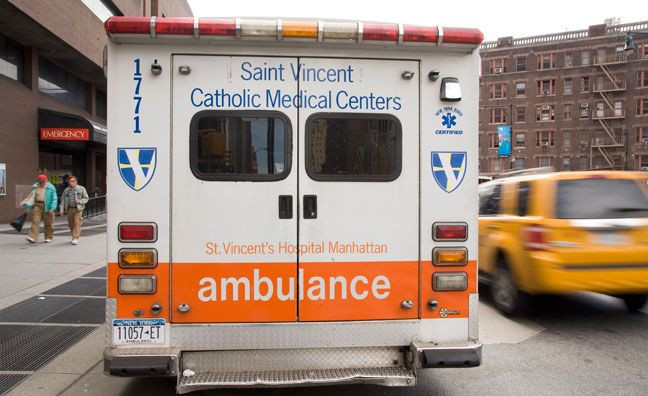For-profit health care and the mental health crisis
As current living conditions get tougher for people, driving them into depression and despair, health-care CEOs are licking their chops at the profits to be made from increased demand for mental health services.

St. Vincent’s Hospital was dismantled in 2010 to build luxury condominiums. Credit: Crain’s New York Business
Mental health care needs are rising in cities across the United States, but existing resources are not even making a dent in the crisis, according to a report released June 2 by the U.S. Conference of Mayors. A survey revealed that, of the 117 mayors who participated, 97% reported requests for mental health care spiking in the past two years. At the same time, 88% of them said there are not enough resources in their cities to address the growing need. (usmayors.org)
Similar conditions are described by Bari Faye Dean in a June 5 report on Becker’s Behavioral Health, a listserv devoted to mental health care in the U.S. (beckersbehavioralhealth.com)
For most people in capitalist countries, there is basic economic uncertainty in a cutthroat world, where survival is tenuous and lonely. It’s easy to lose one’s mental balance. Responses to conditions can take the form of alcohol or drug dependence, depression, despair, acts of desperation, or aggressive and self-destructive behavior.
At the same time, this suffering is an enormous boon for capitalists, from pharmaceutical companies selling supposed “cures” through drugs that “control” undesirable behavior, to insurance companies that reap their profits via all kinds of treatments. Profiteers include hospitals and other agencies; more and more are geared to making money — not to providing effective care and certainly not addressing the root causes of the mental health crisis.
Capitalists profit from suffering
Top corporate executives in the behavioral health field describe the growing demand for treatment as a welcome source of profit. Some of the major companies in the world are health insurance companies, which earn billions of dollars year after year.
The annual Fortune 500 list of the largest corporations in the U.S. ranked by revenue for the 2022 fiscal year was released June 2. It includes 12 companies specializing in medical facilities and eight health insurance and managed care companies. UnitedHealth Group comes out on top in this group, landing fifth in the rankings overall with $324.16 billion in revenue, up 12.7% year over year. CVS Health is next, holding the sixth spot with $322.46 billion in revenue, up 10.4% from 2021.
Even the language describing treatment centers resembles financial parlance more and more. A new hospital center is described as a “start-up,” and its effectiveness is demonstrated by its potential profitability. At the same time, even political leaders like mayors are saying that existing resources are “not making a dent” in the mental health crisis.
One of the main points in UnitedHealth Group subsidiary Optum’s description of how it is equipped to meet the mental health crisis is that “the unit costs for behavioral health are staying within expectations.” That probably means the wages of clinicians do not rise with the general increase in the cost of living.
And if the start-up business venture fails, it sheds its workers and goes somewhere else to try again. While there are many start-ups, there are also many hospital closings, particularly in rural areas — where they are most needed. There are not enough profits to be made there.
Mental health care outside of private practice is generally provided by students, i.e. residents or “lower level workers,” like psychologists, social workers or nurse practitioners. Most hospital caseloads are unrealistically high, and a patient can only expect to see a therapist once every few weeks. Also, therapists who are students or beginning professionals often do not stay at the facility where they are trained. So there is little chance for a patient to develop a relationship with a therapist that has any kind of continuity.
Mostly, the proposed cure for the ailments that come from a dysfunctional capitalist society is medication, but never to provide basic human necessities like food, housing, health care and education – and above all, to belong to a cooperative, social human society. That is not possible under capitalism.
Sue Harris is a psychologist who has worked in psychiatric hospitals and group homes and has been in private practice since 1968. She is co-author of “Interpersonal Psychoanalytic Theory for the 21st Century: Evolving Self,” published by Lexington Books.”

